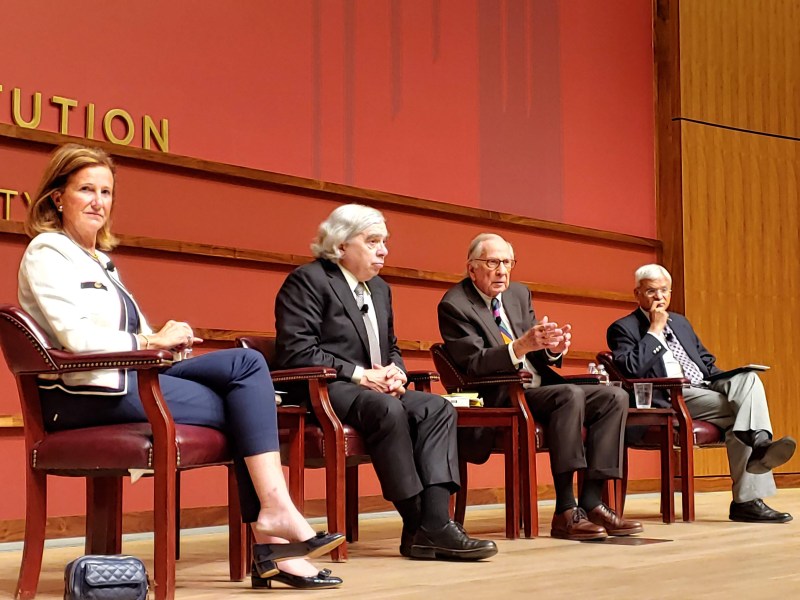“The risk of a nuclear weapon being used somewhere in the world is probably trending in the wrong direction,” said Ernie Moniz, former U.S. Secretary of Energy and co-chair of the Nuclear Threat Initiative, a nonprofit that works to prevent nuclear catastrophe. “[The issue of] preventing the spread of nuclear weapons is a very, very important and timely one.”
The potential existential threat posed by nuclear weapons is at the forefront of contemporary international concern. Former U.S. Secretary of State George Shultz convened a public panel at the Hoover Institution on Tuesday evening to examine how recent technology and global demographics impact the proliferation and use of nuclear weapons. The panel was moderated by management science & engineering professor Elisabeth Paté-Cornell, a former member of the Foreign Intelligence Advisory Board.
Moniz also identified “detection” as an important precaution for nuclear war, citing the 1996 Comprehensive Nuclear-Test-Ban Treaty (CTBT), which aimed to ban above-ground nuclear testing internationally before Congress declined to ratify it. One reason for the failure to ratify was a distinct lack of technology to verify and enforce the testing ban — according to Moniz, the technology now exists to establish an effective international monitoring system.
Among the technological advances identified were drones and multi-spectral imagery, which help nations gain visual insights into where nuclear weapons are being developed, and the digitization of data, which allows for data mining for early detection of risky proliferation behavior.
“We need to think out of the box,” Moniz said, citing improvements in centrifuge and uranium supply chain technology as examples of modern advances in nuclear safety and cost.
Sam Nunn, former U.S. Senator from Georgia and founder of the Nuclear Threat Initiative, brought a Congressional and military perspective to the issue of growing nuclear proliferation.
“We are not going to trust Russia anytime soon, and they are not going to trust us,” Nunn said with regards to bilateral nuclear talks with Russia. “The tremendous breach in trust… makes the world more dangerous.”
According to Nunn, instead of relying solely on mutual trust when forming treaties, Congress depends on compliance verification. He explained that as technology progresses at a rapid pace, the slow process of treaty negotiation and ratification cannot keep up. Nunn also noted the role of nuclear technology as a dual-use item –– referring to both the civilian and military uses of nuclear power –– and encouraged international military-to-military discussion.
“The chances of a nuclear war by blunder greatly exceeds the chances of a calculated, pre-mediated nuclear attack,” Nunn said, “[nuclear powers] have a moral obligation to the world to communicate… so that we don’t get into a WWI-type scenario.”
“Congress is going to have to take the lead on this,” he added.
Nunn pleaded to the U.S. executive branch for longer planning times before a nuclear strike command. Currently, nuclear deployment is expected within five to six minutes of the President issuing a nuclear command. An extension of that critical period to hours or even days would allow for more nuanced and reflective decision making, the former Senator argued.
Ashley Tellis, a senior fellow at the Carnegie Endowment for International Peace, shifted the panel’s focus to nuclear proliferation in India and Pakistan. He contended that nuclear proliferation amongst South Asian countries has created a domino effect: China proliferated to compete with the U.S., India proliferated to keep up with China, and Pakistan proliferated out of fear of India.
“The arsenals in South Asia are actually increasing in size,” Tellis said. “All three countries do not believe that they have reached nuclear sufficiency yet.”
Tellis also brought up security issues with regards to South Asian arsenals, which now contain over 100 nuclear bombs each.
“[The] horses, in a sense, left the barn,” he said, arguing that efforts to denuclearize the South Asian countries are futile. “[We should] focus our attention to making sure that these nuclear weapons are never used to issue threats, are never used [at all].”
This article has been corrected to reflect the gender pronouns Ashley Tellis uses.
Contact Trishiet Ray at trishiet ‘at’ stanford.edu
